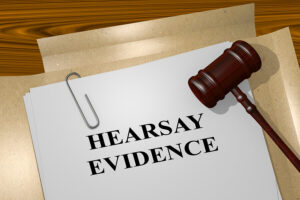
In Massachusetts, hearsay is an out-of-court statement by someone, used for the truth of the statement. It is generally not admissible in court, but there are exceptions.
If you have been charged with a crime in the state of Massachusetts, it is critical that you hire an attorney. My name is Matthew Peterson and I am an experienced criminal defense attorney based in Boston. The criminal justice system can be stressful and intimidating, and I am here to help. I will fight for you in court, and I will do everything I can to secure the best possible outcome.
What is Hearsay in a Criminal Case?
We’ve all heard the word “hearsay” tossed around in everyday conversation, but what does it actually mean in the context of criminal law? In simple terms, hearsay is second hand information that was obtained outside of the courtroom (and/or current trial or court proceedings). A “declarant” in this context is someone who makes the hearsay statement.
For example, if Bill heard Joe say that he saw Mary go into a bank, that is hearsay. And in this case, Bill would be the declarant. If Joe directly testifies that he saw Mary go into the bank, that is not hearsay because it’s coming directly from the source who saw the event take place.
Will Hearsay Come into Evidence for my Criminal Case?
Generally speaking, hearsay is usually not allowed into evidence under the rules of evidence.
Similarly, the Sixth Amendment Confrontation Clause of the Constitution can prohibit out-of-court hearsay statements. This clause states that all defendants (or defense attorneys) have a right to be able to cross-examine any witness who offers evidence against them in their case.
If the witness offering testimony is merely a declarant, they therefore were not a direct witness to the event and cannot be cross-examined. The person who would need to be cross-examined would be the individual who was there when the event took place.
Although hearsay is not allowed in most court cases, there are some exceptions to this rule.
Exceptions to the Exclusion of Hearsay Evidence
- Excited Utterance
- Excited utterance can be described as something a person says in the heat of the moment. If an individual overhears a statement that is determined to be excited utterance, it may be admissible in court as evidence even if the person who said the statement is not available to be cross examined. Excited utterance is an exception to the hearsay rule because it is based on the belief that people who are under the stress of a challenging or tense situation tend not to lie.
- Statements Against Interest
- A statement against interest is a hearsay statement made by a declarant which could possibly incriminate themselves. Statements against interest are an exception to the rule because it is unlikely that someone would make up a false statement if it would incriminate themselves.
- Matters of Record
- Matters of record are official documents that may be used as evidence in court proceedings even though they were not created by the defendant.
- birth certificate
- marriage license
- tax returns
- contracts
- business records
- Matters of record are official documents that may be used as evidence in court proceedings even though they were not created by the defendant.
- Then-Existing Mental, Emotional, or Physical Condition
- This is a statement that has been made that reveals another person of interests’ emotional, mental, or physical state. But, this statement can only reflect one or a combination of those three aspects – it cannot be used to describe what that individual did or said. It can be used to describe the person’s state of mind during the time of the incident in question and can speak to things like motive, emotional state, intent, and plan.
Contact Me Today
If you have been charged with a crime in the state of Massachusetts, it is critical that you hire a defense attorney to help you fight the charges. I take on cases in and around the Greater Boston area, and you can visit my website to see a list of courts I service. I will fight for you in court, and will keep you informed throughout the court proceedings. You can call or text me at 617-295-7500, or you can leave me a message on my website and we will get back to you shortly.



